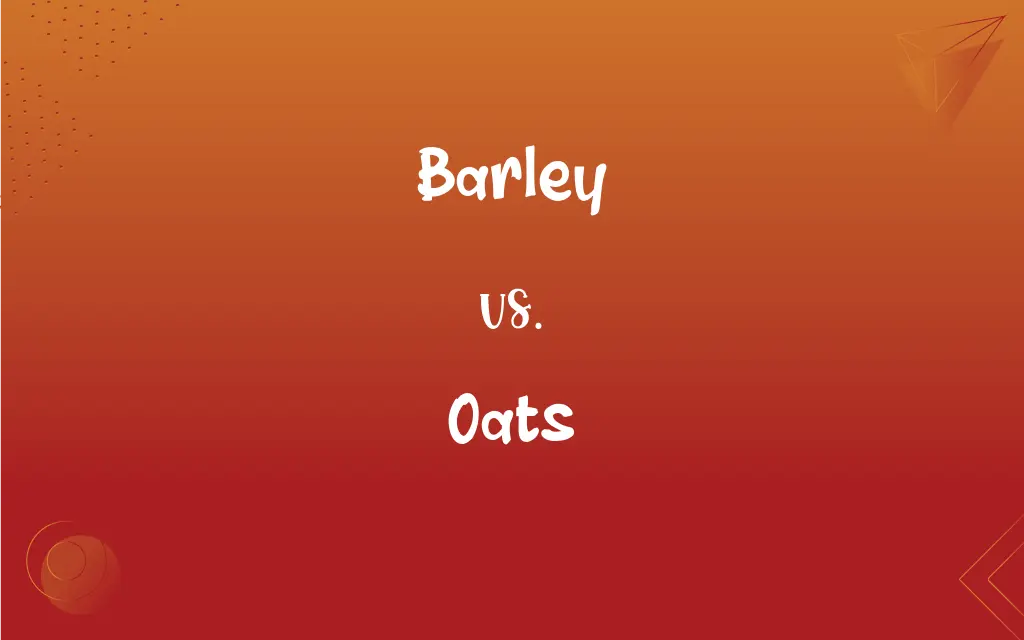Barley vs. Oats: What's the Difference?
Edited by Aimie Carlson || By Harlon Moss || Published on February 29, 2024
Barley and oats are both cereal grains; barley is known for its hardy, adaptable nature and use in beer and soups, while oats are prized for their nutritional value and use in porridge and oatmeal.

Key Differences
Barley is a versatile cereal grain with a rich nutlike flavor and a chewy, pasta-like consistency. It's known for its resilience in various climates, making it a popular crop worldwide. Oats, on the other hand, are renowned for their health benefits, particularly their high fiber content and role in heart health. They are often consumed as oatmeal or rolled oats.
When it comes to nutrition, barley stands out for its high fiber, particularly beta-glucan, which is beneficial for heart health. It also contains essential vitamins and minerals. Oats are equally nutritious, known for their higher protein content compared to other grains and for being a good source of soluble fiber, which can lower cholesterol levels.
In culinary use, barley is often found in soups, stews, bread, and beer brewing due to its chewy texture and distinctive flavor. Oats are more commonly associated with breakfast cereals, like oatmeal, and baked goods, as they lend a soft texture and subtle flavor.
Agriculturally, barley grows in a wider range of conditions, making it a staple grain in many cultures. It's one of the oldest cultivated grains. Oats, while also versatile, are particularly noted for their ability to thrive in poor soil conditions where other crops might fail.
Historically, barley has been a crucial grain for centuries, used in ancient civilizations for food and fermented beverages. Oats were historically considered a weed before their nutritional value was recognized, and they became a staple food in many diets.
ADVERTISEMENT
Comparison Chart
Primary Use
Brewing, soups, bread
Breakfast cereals, baking
Nutritional Highlight
High in fiber, particularly beta-glucan
Higher protein content, soluble fiber
Texture and Flavor
Chewy texture, nutlike flavor
Soft texture, subtle flavor
Agricultural Resilience
Adaptable to various climates
Thrives in poor soil conditions
Historical Significance
Ancient staple, used in fermented drinks
Initially a weed, now a dietary staple
ADVERTISEMENT
Barley and Oats Definitions
Barley
A cereal grain used for food and brewing.
Barley soup is both nutritious and comforting on a cold day.
Oats
A common ingredient in breakfast cereals and baked goods.
Homemade oat cookies are both delicious and nutritious.
Barley
A source of nutritious fiber, vitamins, and minerals.
Adding barley to your diet can improve your digestive health.
Oats
Edible grains produced by the oat plant, used in a variety of foods.
She sprinkled oats over her yogurt for added texture.
Barley
A grain used as a primary ingredient in beer and whiskey.
The brewery sources its barley from local farms.
Oats
Grains known for their nutritional value, especially high fiber content.
Eating oats regularly can help lower cholesterol levels.
Barley
A member of the grass family, widely cultivated for its edible grains.
The barley fields were golden and ready for harvest.
Oats
A versatile grain that is processed in various forms like rolled oats and oatmeal.
Rolled oats are perfect for making overnight oats.
Barley
A hardy cereal that can grow in various climates.
Farmers appreciate barley for its adaptability to different weather conditions.
Oats
A cereal plant cultivated chiefly in cool climates and widely used for animal feed as well as human consumption.
Oats are a staple in many healthy breakfast options.
Barley
A grass in the genus Hordeum native to temperate regions, having flowers in terminal, often long-awned spikes and widely cultivated for its grain.
Oats
Any of various grasses of the genus Avena, especially A. sativa, widely cultivated for their edible grains.
Barley
The grain of H. vulgare or its varieties, used in malt production and as food for livestock and humans.
Oats
The grain of any of these plants, used as food and fodder.
Barley
A cereal of the species Hordeum vulgare, or its grains, often used as food or to make beer and other malted drinks.
Oats
A musical pipe made of an oat straw.
Barley
(Singapore) seed of Job's tears Coix lacryma-jobi
Oats
Plural of oat
Barley
A valuable grain, of the family of grasses, genus Hordeum, used for food, and for making malt, from which are prepared beer, ale, and whisky.
Oats
A mass of oat plants (genus Avena, especially Avena sativa).
Oats are in the north corner of the farm.
Usually oats is last in a rotation and does not get the fertilizer that other feed grains get.
Barley
A grain of barley
Oats
Seeds of an oat plant, especially prepared as food.
Oats is a heart-healthy breakfast food.
Oats are good for you.
Barley
Cultivated since prehistoric times; grown for forage and grain
FAQs
What are oats?
Oats are a nutritious cereal grain commonly used in breakfast foods and baking.
Can barley and oats be used interchangeably in recipes?
While they have different textures and flavors, they can sometimes be substituted in recipes, particularly in soups and stews.
What are the health benefits of barley?
Barley is high in fiber, particularly beta-glucan, and can help improve digestion and lower cholesterol levels.
What makes oats beneficial for health?
Oats are high in soluble fiber, protein, and can aid in heart health and blood sugar control.
Are barley and oats gluten-free?
Barley contains gluten, while oats are naturally gluten-free but may be contaminated during processing.
Is barley good for weight loss?
Yes, its high fiber content can promote feelings of fullness, aiding in weight management.
What is the primary difference in flavor between barley and oats?
Barley has a nutlike flavor and chewy texture, whereas oats have a milder, softer texture.
How long have barley and oats been cultivated?
Barley has been cultivated for thousands of years, while oats have been a staple for several centuries.
What is barley?
Barley is a cereal grain known for its hardy nature and use in foods and beverages.
Are there any allergies associated with barley and oats?
Barley contains gluten, which can cause reactions in gluten-sensitive individuals, while oats are generally well-tolerated but may cause issues if contaminated with gluten.
Can oats help in weight loss?
Yes, oats can be part of a weight loss diet due to their high fiber content and ability to keep you full.
What are the environmental benefits of growing barley and oats?
Both are relatively low-impact crops, with oats particularly beneficial for soil health.
How are barley and oats commonly consumed?
Barley is often used in soups, stews, and brewing, while oats are popular in cereals, oatmeal, and baked goods.
Can barley and oats be grown in similar climates?
Barley can grow in a wider range of climates, while oats prefer cooler climates.
Are barley and oats suitable for diabetics?
Yes, both grains have a low glycemic index and can be part of a diabetic diet.
Can barley and oats be eaten raw?
It's not recommended to eat raw barley due to its hardness, but raw oats, like in muesli, are edible.
How do barley and oats contribute to sustainable agriculture?
They require less water and pesticides compared to some other crops, making them more sustainable choices.
What are the best ways to store barley and oats?
Store them in airtight containers in a cool, dry place to maintain freshness.
Can barley and oats be used in gluten-free cooking?
Oats are naturally gluten-free, but barley is not suitable for gluten-free diets.
What are some popular dishes made with barley and oats?
Barley is commonly used in barley soup and risotto, while oats are used in oatmeal, granola, and oat bread.
About Author
Written by
Harlon MossHarlon is a seasoned quality moderator and accomplished content writer for Difference Wiki. An alumnus of the prestigious University of California, he earned his degree in Computer Science. Leveraging his academic background, Harlon brings a meticulous and informed perspective to his work, ensuring content accuracy and excellence.
Edited by
Aimie CarlsonAimie Carlson, holding a master's degree in English literature, is a fervent English language enthusiast. She lends her writing talents to Difference Wiki, a prominent website that specializes in comparisons, offering readers insightful analyses that both captivate and inform.































































